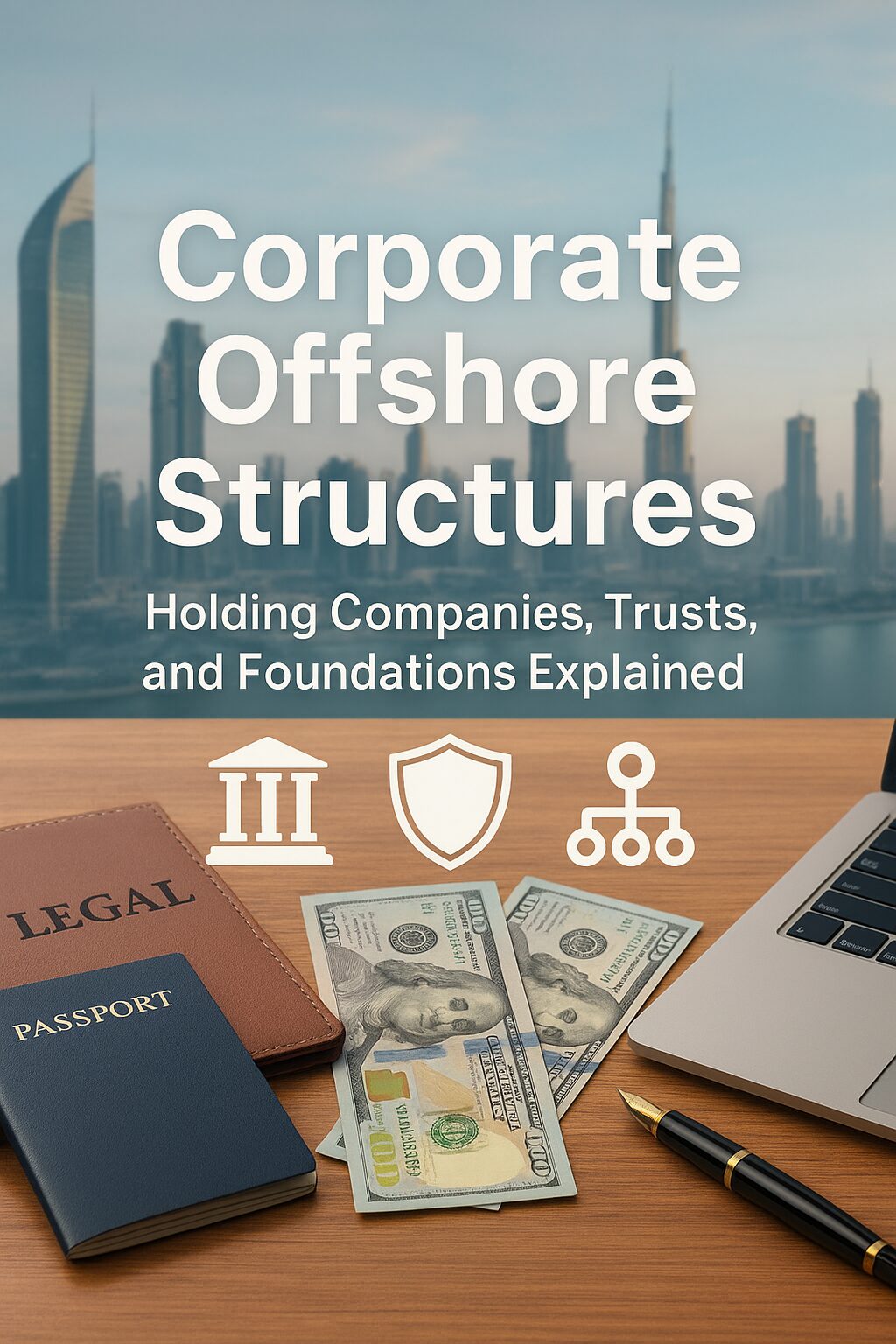Why Structures Matter Beyond Bank Accounts
Opening an offshore bank account is only the first step in building a global financial strategy. True protection and optimization come when you use corporate and legal structures that separate, organize, and safeguard your wealth.
These structures — holding companies, trusts, and foundations — are the building blocks that wealthy families and international entrepreneurs have used for decades. They ensure assets are shielded from lawsuits, taxes are minimized legally, and wealth passes smoothly across generations.
Holding Companies – The Core of Global Business
What Is a Holding Company?
A holding company is a legal entity that owns shares of other companies or assets but does not itself produce goods or services. By centralizing ownership, it provides both protection and flexibility.
Key Benefits
- Tax Optimization: Income can be routed through favorable jurisdictions.
- Asset Separation: Keeps liabilities of operating businesses away from personal assets.
- Flexibility: Easier to sell, transfer, or expand businesses globally.
Case Study
A European tech entrepreneur structured his Asian operations under a Singapore holding company. This allowed him to attract investors, pay lower taxes on dividends, and later exit through an IPO with minimal friction.
Trusts – The Ultimate Asset Protection Tool
What Is an Offshore Trust?
A trust is a legal arrangement where a trustee holds assets for the benefit of beneficiaries. Offshore trusts, established in strong jurisdictions like the Cook Islands or Nevis, are extremely difficult for creditors or governments to penetrate.
Key Benefits
- Lawsuit Protection: Assets in trusts are not directly owned by you, shielding them from lawsuits.
- Succession Planning: Smooth inheritance without probate battles.
- Confidentiality: Beneficiaries can remain private.
Case Study
A wealthy family facing domestic inheritance disputes placed their assets in a Cook Islands trust. The trust ensured that the next generation received wealth without interference, even amid lawsuits at home.
Foundations – Combining Asset Protection With Purpose
What Is a Foundation?
A foundation is similar to a trust but operates as a legal entity, often used in jurisdictions like Liechtenstein or Panama. It provides asset protection, estate planning, and can even carry out charitable objectives.
Key Benefits
- Independence: Unlike trusts, foundations don’t rely on trustees.
- Control: Founders often retain more influence.
- Flexibility: Can manage family wealth, philanthropy, and business holdings together.
Case Study
A European business family created a Liechtenstein foundation to hold their company shares. This structure allowed them to manage dividends, reinvest profits globally, and donate to philanthropic projects, all under one umbrella.
Comparing Offshore Structures
| Structure | Best For | Main Benefits | Limitations |
|---|---|---|---|
| Holding Company | Entrepreneurs, corporations | Tax efficiency, ownership flexibility, liability separation | Requires corporate maintenance, reporting |
| Trust | Families, HNWIs | Asset protection, inheritance, confidentiality | Relies on trustee integrity, setup can be costly |
| Foundation | Families, philanthropists, hybrid needs | Combines asset protection with control & charitable goals | More complex compliance in some jurisdictions |
How to Decide Which Structure Fits You
Step 1: Define Your Goal
- Do you want to protect assets from lawsuits? → Trust
- Do you want global corporate flexibility? → Holding company
- Do you want long-term family planning + philanthropy? → Foundation
Step 2: Choose the Right Jurisdiction
- Holding Companies: Singapore, Hong Kong, Netherlands, UAE
- Trusts: Cook Islands, Nevis, Belize
- Foundations: Liechtenstein, Panama, Austria
Step 3: Ensure Legal Compliance
- Declare where required (e.g., U.S. citizens must disclose).
- Use professional legal and tax advisors to avoid mistakes.
Practical Checklist
- Separate operating businesses from personal wealth using holding companies.
- Use offshore trusts for lawsuit protection and generational wealth transfer.
- Consider foundations for combining family wealth with philanthropy.
- Always diversify across jurisdictions — don’t put all structures in one country.
- Keep compliance records organized and updated.
Conclusion: Building Your Offshore Fortress
Bank accounts alone cannot protect wealth from all risks. Corporate offshore structures — holding companies, trusts, and foundations — are the true fortress walls of global wealth planning.
The wealthy don’t rely on chance; they rely on structures. With careful planning, you can use the same tools to protect your business, secure your family’s financial future, and leave a legacy that lasts for generations.
📌 Next Article Preview
In the next part of this series, we will explore:
“Final Offshore Banking Playbook – Your Global Wealth Safety Net”
This concluding guide will bring together everything — multi-currency accounts, exclusive investments, asset protection, and corporate structures — into a single actionable roadmap. It will be your blueprint for building a secure and borderless financial life.
